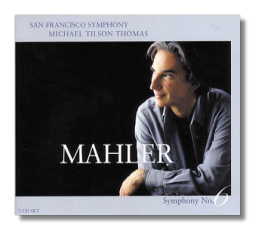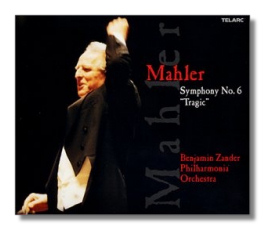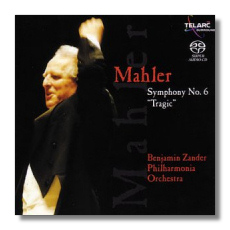
The Internet's Premier Classical Music Source
Related Links
- Mahler Reviews
- Latest Reviews
- More Reviews
-
By Composer
-
Collections
DVD & Blu-ray
Books
Concert Reviews
Articles/Interviews
Software
Audio
Search Amazon
Recommended Links
Site News
 SACD Review
SACD Review
Gustav Mahler

Symphony #6 "Tragic"
San Francisco Symphony Orchestra/Michael Tilson Thomas
SFS 821936-0001 2 Hybrid Multichannel SACDs


With alternative version of finale,
plus a bonus discussion disc
Philharmonia Orchestra/Benjamin Zander
Telarc CD-80586 DDD 3CDs: 54:27, 64:26, 79:43
Also released on Hybrid Multichannel SACD SACD-60586
Amazon
- UK
- Germany
- Canada
- France
- Japan
- ArkivMusic
- CD Universe
I happen to be writing this on the 11th of September. This wasn't planned but it happens to be a coincidence, interesting or not. Whilst Mozart's Requiem is being played to "remember" this date, the three hammer blows in the final movement of the "Tragic" seem more fitting in some odd way. Enough of that, however, for Mahler's Symphony has nothing to do with any specific event and to reduce it or any other piece of music to one is to do an injustice.
Mahler's music took me awhile to get into. The First (Titan as it was called on the cover of the LP I bought, conducted by Bruno Walter) was easy enough but the rest remained an enigma for years (they are still enigmatic however). The 6th, however, was perhaps the most difficult for me. I listened to Horenstein (Unicorn 2024/25) but got nothing out of it. I think that he was unable to overcome the orchestra's inherent limitations. Later I added Bernstein's DG recording (DG 427697) since he was lauded as the greatest Mahler conductor around. The opening movement sounded almost like a parody to me. Then came Barbirolli's recording on EMI (69349) and I had found a performance that I could get into but it still left me feeling there was more to the symphony than I was hearing. In all of the recordings the hammer blows just didn't move me at all and I thought I was supposed to be terrified by them like some call from Revelations.
Well, then these two recordings came out about the same time. Tilson Thomas' was given a rave review in "Gramophone" and equally endorsed in both "American Record Guide" and "Fanfare". All of them mentioned the fact that the performance, from which the recording was made, took place just the day after September 11th and suggested that the deeply emotional result may have been in some way connected to this fact. They also talked about the spectacular recording itself lending to the effect. Then the Zander appeared which has not as yet been reviewed in any of those sources. So, I decided this was the time to give the "Tragic" another try.
I decided not to listen to Bernstein because I agree with Tony Duggan* that his recording turns "Tragedy into Melodrama". I also left Horenstein on the racks so that I could focus on just these two recordings. I pulled out my books, reread Duggan's reviews and checked a couple other sources. Then I began to listen.
First came the San Francisco recording. I listened and listened and listened. Nothing happened. I reread the reviews and tried again, believing I must be missing something. Still nothing made my foot tap. I wasn't spending any time humming some of the music after having listened to it. Finally one night it did seem to get through to me, but the next day nothing remained. I began to wonder if the sound, which I felt was opaque, might have something to do with my reactions. There were details that were hinted at but not really clear and I have one of those fancy DA converters that are supposed to make SACDs sound like the greatest thing since sliced bread. Despite the praise from other sources, the sound lacked the deep bass line I felt was so important to the effect. For what it is worth he uses the critical edition, omitting the third hammer blow. I got up and put on Barbirolli and, sure enough, there was more heft to the music in that older recording.
One reason I had purchased Zanders' recording was because I had been impressed with the previous releases, more so than other writers. I found his 9th to be like Bruno Walter but with a much better orchestra. His Fifth was good but not as spectacular as Chailly's (Decca 458860). Zander's Mahler 4th is fantastic, one of the few to seem to get it right in all four movements. So, I put on the "Tragic" and couldn't leave the room. I was finally swept away by the music… this was the real thing! In the first movement the right/left tread is menacing and when the Alma Theme comes in it just stuns me with the contrasting, sweeping beauty. The second movement is like the surreal reprise of the first that it is supposed to be. The third is just ethereal, other worldly. Then we come to the final movement. The hammer blows literally made me jump out of my seat! The Telarc set offers the opportunity to listen to both renditions of this movement. I prefer the three blows, as does Zander. The experience was emotionally drenching.
A third disc offers the conductor's thoughts on the symphony. It is educational to be able to hear the music that coincides with the discussion. On the other hand Zander's comments don't really add anything to what I had learned from the other sources I consulted.
I should mention, I guess, that both recordings reproduce Michael Steinberg's notes on the symphony taken from his book, The Symphony. If you don't have this book in your collection you really should.
* I would also suggest that you check out Mr. Duggan. He calls the 6th the first 20th Century Symphony and I would agree with him. His site has essays on all of Mahler's Symphonies and offers excellent insights.
http://www.musicweb-international.com/Mahler/
Post Script: I pulled out Kubelík's recording from his cycle for DG (in my collection it is part of the whole cycle he recorded and I don't think it is currently available) It is also more moving than Tilson Thomas'. It is much different, primarily significantly faster, but offers a different facet of the same gem.
The latest issue of "Gramophone" (October 2002) lists the Tilson Thomas as one of the recordings of the year. Go figure.
Copyright © 2002, Robert Stumpf II





















